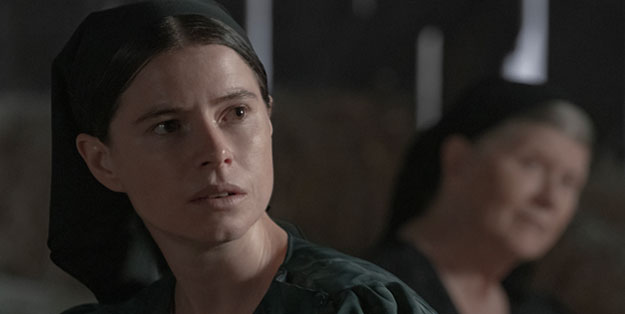
I saw this film and She Said within a day of each other. Both films deal with sexual assault towards women and are based on real events, but while Harvey Weinstein’s scandals are all over the news, few are aware of the story of Mennonite women (not to be confused with the Amish community).
Though the actual violence isn’t shown, the scenes of bloodied garments and beds reveal that these women have suffered rape for years by the men in their own community. As if that weren’t brutal enough, they’ve constantly been drugged by cow tranquilizers so they have no or little memory of what had been done to them. For years they’ve been gaslit into thinking those are ‘ghost rapes’ or ‘visions of hell’ until the perpetrators are caught and proven to be of flesh and blood.
Based on the book by Miriam Toews, the film is set in 2010 but it looked as if it was set decades ago. The old fashion clothes give that impression, as do the color grading of desaturated, almost black-and-white look. Writer/director Sarah Polley, working with DP Luc Montpellier, wanted to create a feeling of “a world that had faded in the past” so that’s an astute use of color to tell a story.

The conversation in the film takes place when the men have left for the city to raise and post bail for those who’ve been arrested for their crimes. Over the course of a few days, three generations of women from two families gather in a barn to decide what to do next. They ponder their options: Do nothing. Stay and fight. Or leave.
As the title suggests, this is a heavy-dialog film that would work well as a play. The set may be simple and minimalistic but the topic of the conversation is deeply complex and emotionally difficult. Claire Foy’s fiery Salome wants to stay and fight, still understandably furious as her three-year-old daughter isn’t exempt from being victimized by the men. Her mother Agata (Judith Ivey) If they choose to leave though, Mariche (Jessie Buckley) argues that God may not be able to find them if they’re not in the community. Frances McDormand who serves as a producer only shows up a few times as ‘Scarface Janz.’ Despite her name, she is a proponent of the ‘Do Nothing’ and forgive the men. It seems an unthinkable notion given the gravity of the crimes, even for the most faithful.

The serene one in the group, Salome’s sister Ona (Rooney Mara) ponders whether forced forgiveness is even true forgiveness at all. Meanwhile, the lone man in the hayloft discussion is a gentle teacher August (Ben Whishaw) who was once exiled by the community. He’s the note taker as the women have never been taught to read nor write and the only man willing to listen to them when their voices are rarely heard.

It may seem like nothing happens in this film, and the subject matter isn’t exactly jolly, but there’s something magnetic in the power of dialog, delivered with honesty and emotional convictions. The conversation is bursting with pent-up emotion and repressed anger from years of oppression. The special effects are the shrewd script and tremendous performances. Polley’s script highlights the courageous acts of these women caught in such an impossible situation. She also astutely captures the realistic nature of how people process and react to things differently, and thus the conversations can be a bit chaotic, disjointed, and even contradictory. I do appreciate moments of levity that break the tension, people in the theater laugh loudly whenever Greta (Sheila McCarthy) starts her tale of her two horses Ruth & Shirley.

Foy, Buckley, and Mara are three of the finest actresses working today and they deliver powerhouse performances. It’s one of the strongest ensemble films of the year, with fine performances from every cast member, including Judith Ivey as Salome and Ona’s mother and Michelle McLeod as Maiche’s younger sister.
Hildur Guðnadóttir’s score has that suspenseful minimalist sound with eerie strings, blending anguish and hope. It might leave some people scratching their heads… hope? How can it be in this situation? But then again we hear stories of hope from prisoner-of-wars and the like because real hope defies circumstances. The scene where the women sing ‘Nearer my God to Thee’ in harmony exemplifies that beautifully.

Now, people watching this who oppose the Christian faith might see this as validation against the faith, but neither Toews’ (who was also raised in the Mennonite community) book nor Polley’s film ever shows the women debating about leaving their faith. In this interview, Toews said, ‘Whatever decision they make, they make within the framework of their faith.’ They separate the flawed believers and the belief itself, as the perpetrators completely go against the Christian teaching to love and protect those who are marginalized, so they don’t just abuse the women but they abuse their own faith too.
It’s a fascinating film that explores the complexity of female friendships, as each woman has their own mind though they live in such a tight-knit community. It’s also a challenging one that asks tough questions that don’t have easy answers, but it’s an absorbing watch. I’m glad I got to see it on the big screen during Twin Cities Film Fest, but also glad it’s the last film I saw as it took me a while to process. One thing for sure, this powerful and vividly intense drama is one that’s hard to shake.

Have you seen WOMEN TALKING? I’d love to hear what you think!
…
Source link
